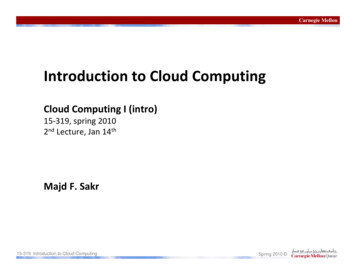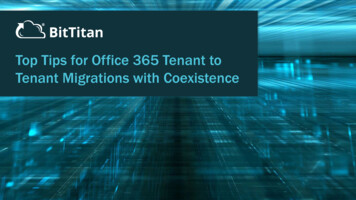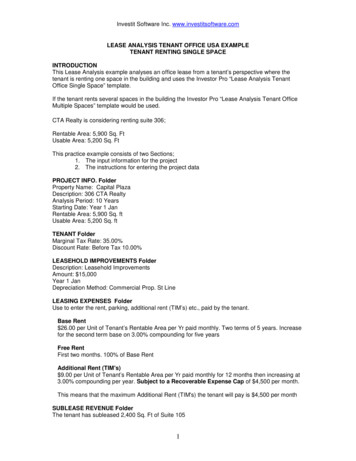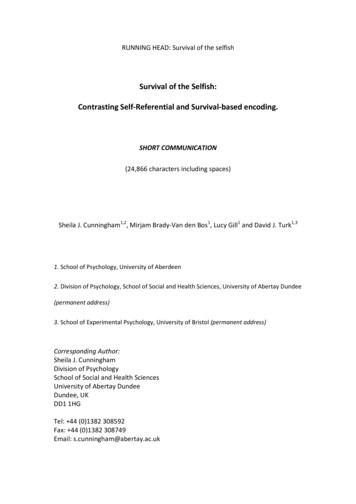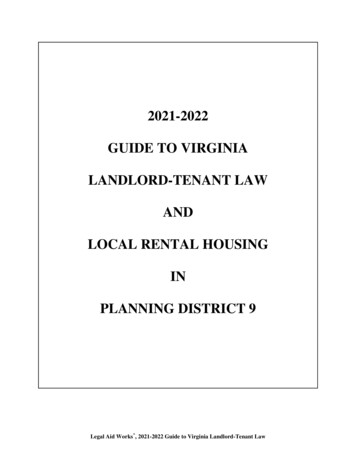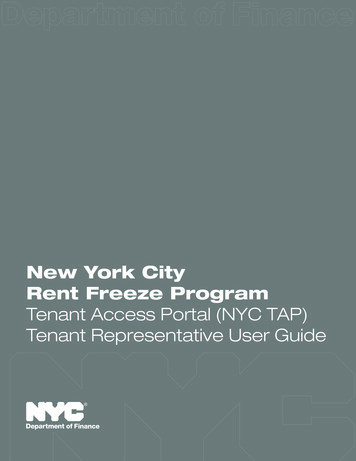![Tenant Survival Guide[1] - The LPA](/img/17/washington-dc-tenantguide.jpg)
Transcription
Washington, D.C. Tenant Survival GuideSeventh Edition December 2006, Published by the Harrison Institute for Public Law in conjunction with the Districtof Columbia Office of the Tenant Advocate,Georgetown University Law Center, 111 F Street, NW, Suite 102, Washington, D.C. 20001, (202) 662-9600Table of ContentsTable of ContentsAcknowledgementsHow to Order Copies of this GuidePermission to Copy1.0 LeasesApplication for a LeaseDiscriminationSigning a LeaseThe Meaning of Certain Lease ClausesWaiver of Notice to QuitLate FeeRight of EntryRules and Regulations for Tenant ConductIllegal Lease ClausesWaiver of D.C. Housing RegulationsWaiver of Warranty of Habitability or Duty to RepairWaiver of Liability or "Exculpatory Clauses"Requirement that Tenant Pay Attorney and CourtFeesWaiver of Right to a Jury TrialConfessed Judgment by Someone other than TenantWaiver of Notice of Offer of SaleWhat Happens When Your Lease Expires2.0 Security DepositsHow to Protect Your Money Before You Move InHow to Protect Your Money While You Are RentingHow to Protect Your Money When You Move OutWhat Steps Can You Take To Get Your Money Back?3.0 RepairsHousing Code Standards - InsideHousing Code Standards - OutsideSteps For Getting Repairs MadeReceivership4.0 Renter's Insurance5.0 EvictionsWhat Happens When Your Lease ExpiresHow Does the Eviction Process WorkNotice from Your LandlordSummons to Appear in Landlord-Tenant CourtHow to Challenge a Notice to VacateLegal Reasons for EvictionRelocation AssistanceDrug Related EvictionsWhat You Should Do When You Get an Eviction NoticeGoing to CourtRight to a TrialWhat Happens If You Lose At TrialWhat Is a Writ of EvictionHow to Fight a Writ of EvictionWhat If You Cannot Stop the Eviction6.0 Drug Related EvictionsDrug Related EvictionsWhat Happens When An Action is CommencedPreliminary InjunctionDefenses Against an ActionWhat Other Parties May Make a Complaint7.0 Rent ControlLimitations on Rent IncreasesProtections for Elderly and Disabled TenantsOther Allowable Rent IncreasesHardship IncreaseCapital Improvement IncreaseSubstantial Rehabilitation IncreaseService and Facilities IncreaseVacancy IncreaseVoluntary IncreaseLegal Requirements for Rent IncreasesHow to Challenge a Rent IncreaseDisclosure to TenantsRent Control Exemptions8.0 Retaliatory Action9.0 Tenant Petitions and Conciliation10.0 Chief Office of the Tenant Advocate11.0 Federally Subsidized Housing12.0 Public Housing13.0 Condo and Coop Conversion ControlsWho May ConvertNotice of Tenant ElectionTenant Voter EligibilityConduct and Results Of The ElectionCoercion ProhibitedNotice of Intent to ConvertProtection for Elderly and Disabled TenantsRelocation Assistance14.0 How to Buy Your BuildingWhy Buy Your BuildingThe Offer of SaleThe Purchase ProcessFirst Stage: Negotiation of ContractSecond State: Negotiation of ContractThird State: Settlement PeriodThe Right of First RefusalThe Start Over PeriodAssignments and PartnersWaiver of RightsThe Homestead ProgramGetting Assistance15.0 Forming a Tenant PrganizationSteps to Forming a Tenant OrganizationTenant Right to Organize Act16.0 Incorporating a Tenant Association
Why IncorporateWhat Does Incorporation MeanHow Do You IncorporateBylawsSample Articles and Bylaws17.0 Homeownership Programs18.0 Agencies and informationDistrict Government Regulatory AgenciesInspectorsFor hundreds of years, the relationship between landlordsand tenants was characterized by tenants having very fewrights against landlords. Now, however, the courts andthe Council of the District of Columbia have made lawsthat redefine this relationship and, as a result, tenants inthe District of Columbia today have many legal rightsrelated to rent, building condition, and purchase of theirbuildings. This guide is an introduction to these reformsin landlord-tenant law. The guide not only outlines tenantrights, but also is a reminder of tenant responsibilities topay rent, respect the landlord's property, and comply withlease terms. Because the law is complex and constantlychanging, tenants should not rely solely on the briefsummaries of law contained in this guide. Tenants shouldcontact the legal service organizations or other agencieslisted in the last section of the guide (Agencies andInformation) for detailed information.AcknowledgementsThe seventh edition of Tenant Survival Guide was writtenunder the coordination of the Harrison Institute for PublicLaw of Georgetown University Law Center. This guide is inpart based on an original edition published in 1979 by CityWide Housing Foundation and University Legal Services; asecond edition published in 1983 by the Harrison instituteand NCB; a third edition published in 1986 by theHarrison Institute; a fourth edition published in 1989 bythe Harrison Institute; a fifth edition published in 1997 bythe Harrison Institute; and a sixth edition published in2003 by the Harrison Institute. The current edition wasedited by Benita Jones at the Harrison Institute. Fundingfor this edition was provided by the Office of the ChiefTenant Advocate.How to Order Copies of thisGuideCopies are available at the Harrison Institute for PublicLaw, 111 F Street, NW, Suite 102, Washington, D.C.20001, (202) 662-9600. For more information about theHarrison Institute, sing.html.EvictionsEmergency SheltersLegal Services for Individual TenantsLegal Services For Tenant OrganizationsLegal Services For Those Who Do Not Qualify ForFree Legal HelpForming a Tenant OrganizationAffordable Housing DevelopersMiscellaneousreproduced in any manner for commercial purposeswithout the express written permission of theHarrison Institute for Public Law at the GeorgetownUniversity Law Center.1.0 LeasesA lease is an agreement between you and yourlandlord. The landlord agrees to provide a clean,sanitary, and vacant apartment and to make repairsrequired by the D.C. Housing Code. You agree to paythe rent, keep your apartment or house clean andundamaged, and follow the rules and regulations ofyour lease.Leases are usually in writing. Typically, a landlord willprovide a pre-printed form that you will be asked tosign. Leases may also be "oral" or unwrittenagreements. An oral lease gives you the same basicrights as a written lease, but they are harder toenforce and you should try to have your lease put inwriting.A. Application for a LeaseWhen you apply to rent a house or apartment, youare actually applying to qualify for a lease. Usually,the landlord will require you to fill out an applicationform and pay an application fee before you sign thelease. The application typically requests informationon employment history and credit references andoften becomes part of the lease. Read the applicationthoroughly and give true and accurate information.If you give false information, the landlord may laterbe able to evict you.When you fill out a rental application to lease anyrent-controlled unit in the District, the landlord isrequired to inform you of the unit’s rental history.The landlord must give you a disclosure form thatlists the following: Copyright : The HarrisonInstitute for Public LawThis Tenant Survival Guide may not be reprinted or that the unit has been properly registeredas exempt from rent-control;the amount of the non-refundableapplication fee;the amount of rent and any additionalsurcharges for the unit;the frequency that rent increases may beimplemented;a pamphlet published by RACD explainingtenant rights and resources;
the amount of the initial security deposit (ifany), the interest rate of the deposit, and howthe deposit will be returned once you leave;all reports for housing code violations issuedwithin the previous year;any pending tenant or landlord petitions thatcould effect the unit;information identifying the building’s owner; andif the building is in the process of converting to acooperative or a condominium.B. DiscriminationIt is illegal for a landlord to refuse to rent to you ordiscriminate against you because of your race, color,national origin, sex, age, source of income, religion,marital status, sexual orientation, family responsibilities,parental status, personal appearance, physical handicap,political affiliations, place of residence or business, orstudent status. It is also illegal to refuse to rent tosomeone because they would pay the rent using a Section8 voucher. If you believe the landlord has discriminatedagainst you, a complaint can be filed with the D.C. Officeof Human Rights, 441 4th Street, NW, 9th Floor North,Room 970, (202) 727-4559. If you believe thediscrimination is based on eligibility to receive assistancefrom the Tenant Assistance Program, age, or presence ofchildren, you may also file a complaint with the D.C.Department of Consumer and Regulatory Affairs, RentalAccommodations and Conversion Division (RACD), 941North Capitol Street, NE, Room 7100, (202) 442-4477.C. Signing a LeaseOnce the landlord approves your application, the landlordmay require you to sign a written lease before movinginto the apartment or house. Read the lease before yousign it. If you have trouble understanding any provisions,ask for an explanation or assistance. Be aware that somelease clauses are illegal. (See the subsection belowentitled "Illegal Lease Clauses".) If the landlord requires asecurity deposit, make sure that the amount and terms ofthe security deposit are clearly spelled out in the lease.(See the section on Security Deposits.)When you are about to sign a written lease, sometimesthe landlord will promise orally, or ask you to promiseorally, to do something that is not contained in the writtenlease. If this happens, you must be careful because oralpromises are very hard to prove. If the landlord makesany oral additions to your written lease, make sure towrite the additions or changes in the lease before you signit. Then sign your initials and ask your landlord to sign hisor her initials next to each addition or change.Before you sign the lease, the landlord must give you:a written notice if the landlord is exempt from rentcontrol;a copy of the application you filled out; and,a copy of Chapter 1, Section 101 (Civil EnforcementPolicy), Chapter 1, Section 106 (Notification ofTenants Concerning Violations), and Chapter 3(Landlord and Tenant) of the D.C. HousingRegulations.D.C. Tenant Survival GuideThe Harrison Institute for Public Law3pageAfter you sign a lease the landlord must give you anexact, legible, and signed copy of the lease andapplication within 7 days. Always keep your lease,application, and other documents concerning yourapartment or house in a safe place.If a vacant unit is rent-controlled, certain rules applyto the landlord’s ability to raise the rent for a newtenant. Once a tenant has vacated an apartment, alandlord may raise the price of the unit before rentingthe unit to a new tenant. The landlord can choose toraise the rent to 10% more than the former tenant’srent, or to the equivalent rent of a comparable unit inthe building. However, if the landlord chooses toraise the rent to the equivalent of a comparable unitin the same building, the total increase cannot bemore than 30% higher than the former tenant’s rent.Also, the landlord must provide the new tenant with astatement indicating the amount of all rent increasesfor the apartment over the previous 3 years(including the most recent vacancy increase), and thebasis for each increase, within 15 days. If thelandlord has taken the vacancy increase, thedisclosure statement to the new tenant must identifythe substantially similar unit on which the increasewas based. For further information on rent increases,see the section on Rent Control.D. The Meaning of CertainLease Clauses Waiver of Notice to Quit"Waiver of notice to quit" is a lease clause that allowsthe landlord to start eviction proceedings withoutgiving a tenant the usual 30-day Notice to Quit. (Seethe section on Evictions for further details on theeviction process.) This waiver is legal only when theeviction is based on non-payment of rent. When theeviction is based on other reasons the landlord mustgive you proper written notice before evicting you. Late FeeA "late fee" is the money the landlord may charge forlate payment of rent. The landlord cannot charge atenant a late fee for late payment of rent unless thelease states that it will be charged. The landlord isalso prohibited from raising the amount of the latefee above the amount written in the lease. If you payyour rent late one month and do not pay the late fee,some landlords will continue to charge a late feeevery month until all fees are paid, even if the rent ispaid on time during those months. The law is notclear on this practice, but most judges will not allowthe landlord to do this. If your landlord is chargingyou late fees every month, even though you arepaying on time, you should get help from a lawyer.(See the section on Agencies and Information forlegal assistance.)
Waiver of Right to a Jury Trial Right of Entry"Right of entry" means that the landlord may come into atenant's apartment to inspect for damages, make repairs,and show the apartment to persons interested in living inthe building. However, the landlord can request entry onlyat reasonable times and for a good business reason. Atenant has a right to privacy and can object to excessiveor unreasonable visits. For more information, contact theRental Accommodations and Conversion Division (RACD)of the D.C. Department of Consumer and RegulatoryAffairs, at (202) 442-4477.When faced with eviction tenants have the right toeither a trial by jury or a trial by a judge. A leasecannot require a tenant to waive the right to a jurytrial. Confessed Judgment by SomeoneOther Than TenantA lease cannot authorize any person other than thetenant to confess judgment against the tenant. A"confessed judgment" is a written agreement thatallows judgment to be entered against the tenant ifhe or she does not pay rent or violates some otherlease term. Rules and Regulations for Tenant Conduct Waiver of Notice of Offer of Sale"Rules and Regulations for Tenant Conduct" refers to rulesincluded in the lease or other rules established by thelandlord. A landlord may evict a tenant for violating theserules, but the landlord must first give the tenant a writtennotice (generally called a "Notice to Cure or Vacate") thatstates the tenant has 30 days to correct the problem. Ifthe tenant fails to correct the problem within 30 days thelandlord may then start eviction proceedings.When a landlord wishes to sell or demolish a buildingor wants to discontinue the building's housing use,D.C. law requires the landlord to provide the tenantswith notice informing them that tenants have theright to buy the building. A lease cannot require atenant to waive this notice requirement. (See thesection on How To Buy Your Building for details aboutthe tenant purchase process.)E. Illegal Lease ClausesF. What Happens When YourLease ExpiresA lease clause is illegal or has no legal effect if it violatesa D.C. law or denies a tenant the rights provided by theD.C. Housing Regulations. The following are examples ofillegal clauses: Waiver of Warranty of Habitability orDuty to RepairNo matter what type of lease you have—written ororal, month to month or annual—your landlordcannot evict you without a legally valid reason. (Seethe section on Evictions for details on the evictionprocess.) In fact, after a lease expires you cancontinue to stay in your apartment as long as youcontinue to pay rent. The terms of your expired leasecontinue to be in effect with the exception that yourrent may increase after a valid 30 day notice. Toincrease your rent, your landlord must file a noticewith the RACD. Any increase must meet certain legalrequirements. (See the section on Rent Control fordetails regarding rent increases.)A landlord has a duty to provide habitable apartments orhouses and to repair housing code violations. A landlordcannot waive this duty in a lease. (See the section onRepairs for more details regarding Housing Codeviolations.) Landlords have the responsibility to providehabitable or livable apartments or houses, in accordancewith the Housing Code Standards. You should not beasked to sign any waiver in the lease that relieves thelandlord from repairing housing code violations.If you do not wish to remain in your apartment afteryour lease expires (or you wish to leave at somelater date), you must comply with the terms of yourlease regarding proper notice to your landlord. Uponvacating your apartment, you are entitled to thereturn of your security deposit (with interest in somecases) from your landlord unless you have damagedyour apartment. (See the section on SecurityDeposits for more details on this process.) Waiver of Liability or "ExculpatoryClauses"2.0 Security Deposits Waiver of D.C. Housing RegulationsA lease cannot contradict or require a tenant to waive anyterms of Chapter 1, Section 101 (Civil Enforcement Policy)and Section 106 (Notification of Tenants ConcerningViolations), or Chapter 3 (Landlord and Tenant) of theD.C. Housing Regulations. You should receive a copy ofthese regulations before you sign the lease.A lease cannot limit the landlord's liability for negligenceor failure to make repairs. Requirement that the Tenant PayAttorney and Court FeesA lease cannot require a tenant to pay attorney fees andcourt costs in any court action. The judge decides whopays the court costs and tenants rarely have to pay theirlandlord's attorney fees.D.C. Tenant Survival GuideThe Harrison Institute for Public Law4pageMost tenants in D.C. pay their landlord an additionalone month's rent (called a "security deposit") whenthey first move into their apartment. D.C. lawrequires the landlord to return the entire securitydeposit (plus interest if you have lived there for 12months or more) when you move out, unless thereare damages in the apartment beyond normal wearand tear. Unfortunately, many landlords do notcomply with the law and return this money only if the
tenant knows the law and exercises his or her legal rights.A. How to Protect Your MoneyBefore You Move InThere are important steps you should take to protect yoursecurity deposit before you move in:1. Inspect the apartment with your landlord and awitness (for example, a friend, family member, orcommunity organizer) before you move in. Make alist of all existing damages such as holes or cracksin the walls or floors, water damage, etc. Makesure you sign and date the list. Also ask thelandlord to sign the list. Give one copy of the listto the landlord and keep one copy for yourself.You may also want to take photographs. This listwill prevent the landlord from trying to charge youfor these damages when you move out.2.The landlord is not allowed to ask for more thanthe one month's rent as a security deposit. Also, asecurity deposit can only be collected once. “Ifyou paid more than one month’s security deposit,you can file a tenant petition at DCRA/OAH.”3.The landlord must immediately place your securitydeposit in an escrow account that earns interestat the prevailing passbook rate. At the end ofeach calendar year, the landlord is required topost a statement in the lobby of your building andthe rental office that indicates where your securitydeposit is held and what the interest rate was foreach 6 month period in the past year. Neither younor your landlord can use the security deposit orinterest for anything until you move out.C. How to Protect Your MoneyWhen You Move OutWhen you decide to move out, there are importantsteps you should take to ensure that your landlordreturns all the money that is owed you:1.At least 30 days before you move out,write a letter to the landlord that statesthe date you will move out” .and sendthe letter certified mail, return receipt.”Keep a copy of this letter. If you mustmove sooner than 30 days and cannot givethe usual 30 day notice, ask the landlord toagree in writing that you may move outsooner without any penalty and withoutwaiving (or giving up) your right to yoursecurity deposit. If you are moving outbefore the end of your lease term (or, inother words, you have "broken yourlease"), you may need a lawyer to help youget your security deposit back.2.Be present if your landlord conducts aninspection of your apartment. Under D.C.law, your landlord may inspect yourapartment from 3 days before to 3 daysafter the end of your tenancy to see if youhave caused any damages beyond normalwear and tear. Notice of this inspectionmust be sent to you at least 10 daysbefore the inspection.3.If your landlord does not inspect yourapartment before you leave, make a list ofdamages that were not caused by you (asyou did when you first moved in) and invitea witness to inspect the apartment withyou. Take photographs and make sure yousign and date your list. If the landlord thentries to keep part of your security depositdue to these damages, you should be ableto claim (and prove) that the damagesexisted before you moved in (based onyour move-in list and photographs) oroccurred after you moved out.4.Leave your future address with yourlandlord.4. Make sure that the landlord has clearly stated theterms and conditions of your security deposit inthe lease or on the receipt for your securitydeposit or other payment. Keep a copy of theseterms in a safe place.B. How to Protect Your MoneyWhile You Are RentingA landlord may attempt to keep your security depositafter you move out by claiming that you failed to pay yourrent or caused damage to the apartment. Therefore, inaddition to the steps mentioned in this guide, you shouldkeep good records of all your rent payments and anyrequests for repairs while you are living in yourapartment. For instance, each time you pay your rent,keep your cancelled check, a bank statement showing thatthe check has cleared, a copy of your money order, or areceipt from the landlord for cash payment. Keep theserecords in a safe place. Also, whenever you write or callthe landlord about your rent, repairs, or other matters,make a list of the calls and keep a copy of allcorrespondence.Within 45 days after the termination of your tenancy,your landlord must either return your security depositplus interest or notify you in writing that he or sheplans to keep all or part of your security deposit. Thewritten notice must be delivered to you personally orsent by certified mail. You are also entitled to a list ofthe interest rates for each 6 month period duringyour tenancy.Within 30 days of the notice that your landlordintends to keep part or all of you security deposit,your landlord must return the balance plus interestand send you an itemized list of all repairs or otheruses of the money not returned to you.The failure of your landlord to comply with thisrefund and notice process gives you the right to a fullD.C. Tenant Survival GuideThe Harrison Institute for Public Law5page
return of your deposit plus interest.In addition, any landlord who acts in bad faith in failing toreturn a security deposit will have to give you triple theamount of the security deposit. Bad faith is any frivolousor unfounded refusal to return a security deposit asrequired by law, which could be motivated by afraudulent, deceptive, misleading, dishonest, orunreasonable self-serving purpose. A landlord does notact in bad faith by acting out of simple negligence, badjudgment, or an honest belief in the course of action thathe or she has taken. “In addition, any landlord who acts inbad faith in failing to return a security deposit may haveto give you triple the amount of the security deposit.”D. What Steps Can You Take ToGet Your Money BackIf your landlord does not notify you of the status of yoursecurity deposit within 45 days, refuses to refund yoursecurity deposit, or keeps more money than you think isfair, you can take one or more of the following steps:1.Call the Rental Accommodations andConversion Division (RACD) of the D.C.Department of Consumer and Regulatory Affairs(DCRA), (202) 442-4477, and ask forassistance in getting your security deposit back.2.Take the landlord to Small Claims Court. This isa quick and inexpensive method: it takes 30days to get a hearing, and the cost for filing alawsuit is 3.74 for each person being sued plus 5 for claims up to 500, 10 for claimsbetween 500 and 2,500, and 45 for claimsover 2,500. The court is simple and informal,and you do not need a lawyer. Many landlordswill return your security deposit when facedwith a summons to appear at Small ClaimsCourt. To use the Small Claims Court, yourclaim must be less than 5,000. For furtherinformation, call the Small Claims Court Clerk at(202) 879-1037 for information in both Englishand Spanish.3.If you think the landlord is violating the law,call the RACD, (202) 442-4477, and ask forassistance in filing a tenant petition against thelandlord. A tenant petition is similar to alawsuit, and you can initiate a case against thelandlord.Whatever step you take, you should act as quickly aspossible. If you take no action in the three years afteryour tenancy ends, your landlord has no obligation toreturn the security deposit.3.0 RepairsDistrict of Columbia laws require your landlord to provideapartments that are in a safe, habitable and livablecondition. The landlord has a duty to make all repairsnecessary to make buildings and apartments habitable.D.C. law also requires landlords to maintain buildings andapartments according to many established standards,including the Housing Code Standards listed below. TheHousing Regulation and Enforcement Division of theD.C. Tenant Survival GuideThe Harrison Institute for Public Law6pageHousing Regulation Administration, a part of theDepartment of Consumer and Regulatory Affairs(DCRA) is responsible for administering the D.C.Housing Code and related regulations. For moreinformation on the D.C. Housing Code, refer to Title14 of the D.C. Municipal Regulations. You can requesta copy of the D.C. Housing Code by contacting theHousing Inspection Section of the Housing RegulationAdministration at DCRA at (202) 442-4400.You should frequently check your building andapartment to determine if repairs are needed andwhether your landlord is complying with the HousingCode based on the standards below. If repairs areneeded, you should notify the landlord using themethod described in the lease. As often as possible,make your repair requests in writing. (See thesubsection below entitled “Steps for Getting RepairsMade” for details on this process.) As with any matterdiscussed with your landlord, you should keep arecord of all telephone calls and copies of allcorrespondences (letters, forms, etc.).You will usually be more successful in getting repairsmade if you have a tenant organization negotiatingwith the landlord. (See the sections entitled Forminga Tenant Organization and Incorporating a TenantOrganization.) Being a member of a strong tenantorganization will make it much easier for you to getrepairs made.A. “Inside the Apartment”Housing Code Standards Bathrooms: A bathroom must be private andventilated, it must have a bathtub orshower, toilet, sink with hot (at least 120degrees) and cold running water, and itmust have a waterproof floor and wall base. Cleanliness: Apartments must be free ofinsects, rats, and mice. Apartments mustalso be free of dirt, dust, cobwebs, garbage,and litter at the time of move-in. Tenantsare responsible for keeping theirapartments clean after they move in. Insects: Insects such as roaches, ants, waterbugs, etc. are prohibited. Doors: Doors must not be blocked, mustopen and close easily (particularlyemergency exits and fire doors), and mustfit reasonably well within their frame. Knobsand locks must be in good workingcondition. Electricity: Each apartment or house musthave two separate electrical outlets perhabitable room (one of which must be awall or floor convenience outlet), wires withgood insulation, and correct fuses.Permanent extension cords are prohibited.Each room must have lights. Fire Safety: Lighted fire exit signs, fireextinguishers, a fire alarm system, and
smoke detectors in good working order arerequired. Fire doors must be unlocked and fireescapes (where applicable) must be in workingorder. (The D.C. Fire Safety Act also providesrequirements related to fire safety and smokedetectors.) Floors: Floors must be clean, sound, waterproof,and level. Cracks, holes, splinters, and rat ormouse holes are prohibited. Hallways: Halls must be clean, well lit, andwithout blockage or obstruction. Heat: If a tenant cannot control heat settingswithin the unit, the landlord must insure heatingequipment maintains the temperature at least68 degrees Fahrenheit during the day and 65degrees Fahrenheit at night in all occupiedrooms and bathrooms. Hot Water: Water temperature must reach 120degrees Fahrenheit in the kitchen and bathroom. Kitchens: All facilities provided by the landlordfor cooking, storage, or refrigeration of foodmust be maintained in a safe and good workingcondition. The kitchen sink must have hot andcold running water. Lighting: All rooms, including laundry, furnace,and storage areas, must have natural and/orartificial lighting. Lighting must be provided in allhallways and over stairs. Paint: Paint must not be peeling or flaking andmust not contain exposed lead paint. Plumbing: Leaky plumbing is prohibited. Eachapartment must have hot and cold runningwater in the kitchen and bathroom. Privacy: Each apartment must have a door to anoutside hallway or the street. Bathrooms mustpermit privacy; tenants must be able to get tothe bathroom and bedrooms without goingthrough another bathroom or bedroom.and close easily, must contain glass withoutcracks or holes, and must be without air orwater leaks.B. “Outside the Apartment”Housing Code Standards Cleanliness: All walks must be free of dirt,garbage, litter, rats, mice, and insects. Thegrass must be cut. Foundation: The foundation must
2003 by the Harrison Institute. The current edition was edited by Benita Jones at the Harrison Institute. Funding for this edition was provided by the Office of the Chief Tenant Advocate. How to Order Copies of this Guide Copies are available at the Harrison Institute for Public Law, 111 F Street, NW, Suite 102, Washington, D.C. 20001, (202 .


